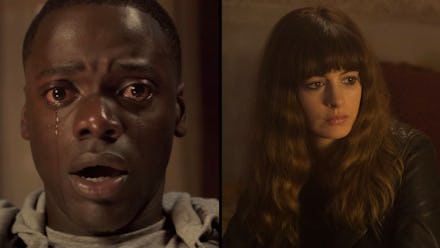'Colossal' and 'Get Out' are paving the way for a new "woke horror" genre

At first glance, Colossal protagonist Gloria seems to have more in common with Get Out's Rose Armitage than Chris Washington. Like Rose, Gloria is pretty, brunette, white and affably charming. She's more fucked up — battling an alcohol problem and a rapidly deteriorating life after her boyfriend Tom kicks her out — but you get the impression she's never too far gone. Her privilege keeps her comfortable, while Chris is permanently on guard in his story.
[Editor's note: Spoilers ahead for both Get Out and Colossal.]
Gloria experiences none of what Chris does — he's lured into a racist trap to steal his body — but she's got her own troubles. For instance, she finds out she's somehow controlling a giant kaiju terrorizing South Korea. For another, her childhood friend Oscar is a manipulative jerk who takes out his own insecurities on her.
Yet they're both victims; Chris faces down liberal racists that facilitate his death while insisting they would have voted for Obama for a third term. Gloria, meanwhile, faces the menace of toxic masculinity that threatens and harasses women on a daily basis. Get Out and Colossal take two examples of the horror genre — thrillers and monster movies — and deepen them beyond surface-level entertainment. They are the pioneer films in what we might call a new genre of "woke horror."
"Woke horror" could best be defined as films that add a socially conscious element. The key is the messaging of the movie doesn't overpower it or take away the more traditional genre elements, but adds an extra layer underneath everything.
In Get Out's case, director Jordan Peele zeroes in on the way the most privileged members of the left-wing can be both actively and passively threatening to black lives. The white people in the film admire black bodies, but only for their own personal gain; the people inhabiting those bodies are merely brains to be discarded, their bodies sent to auction.
Colossal, meanwhile, introduces Oscar as a nice guy, childhood friend of Gloria's who tries to help her get back on her feet after life goes wrong. When Gloria doesn't respond with sexual or romantic interest, instead flirting with Oscar's friend Joel, Oscar's friendly façade disappears, and the monster lying just underneath his skin reveals itself. He's emotionally and physically abusive to her, using her alcoholism as a trap to keep her from leaving his presence.
Sure, Get Out still has jump-scares, and Colossal has monster fight scenes. But it's nigh-impossible to ignore the greater story happening below all the genre thrills and trappings.
Neither film is too serious-minded; in fact, both are enormous fun, with plenty of great comedic beats. It's a point Anne Hathaway made in a recent interview: The lack of gravity actually helps in telling an important story.
"I'm very happy that Colossal is a movie that can make you think without making you sad," the actress said. "There's more ways to discuss a problem than just being serious about it, or being earnest."
Going too far toward earnestness would make these films feel like after-school specials, and almost surely wouldn't draw great critical and commercial response. Instead, these movies inspire not just one casual watch, but rabid searching for all the Easter eggs and hidden messages in them. Directors Peele and Nacho Vigalondo have made not just woke horror movies, but films that work well in an age of obsessive viewing.
So far in 2017, we have two examples of "woke horror" — two that would make "a really fun double feature," Hathaway noted. They offer promise for the future of blending unexpected genres with smart, socially aware messaging. Of course, there will be overreactions from critics, as there were in response to Get Out. You can already imagine Colossal inspiring angry mobs on men's rights forums and subreddits.
The overall impact is well worth the blowback, however. In 2017, this is the kind of storytelling we need: not just fun escape and not just smart social commentary, but a mix of them both.
Mic has ongoing movies coverage. Follow our main movies hub.